- Home
- William Shatner
Up Till Now Page 23
Up Till Now Read online
Page 23
The popularity that I’d gained from Star Trek made me a welcome guest on game shows. Mark Goodson and Bill Todman, who produced so many of those shows, really liked me. There were a lot of actors, the Robert De Niros of the industry, for whom doing a quiz show or a game show might have been considered a bit of comedown, but it hasn’t been one for me at any time in my career—especially at that time. Game shows were fun and I enjoyed doing them. They provided great exposure—it was very good publicity for whatever project I was doing—but mostly for me. And finally, by any ordinary standards the money was good. Maybe not to the $10 million per picture actors, but to me. If I hadn’t enjoyed doing these shows, well, I would have done them anyway. We would tape five shows in one day, and I could just hear my father telling me what to do. “Are you crazy? You’re going to turn down a thousand dollars for one day’s work? You know what I could have bought for a thousand dollars? And you call that work? Sitting there and playing a game? I’ll tell you what work is!”
Among the game shows I did were Hollywood Squares, The $20,000 Pyramid and The $25,000 Pyramid, Rhyme and Reason, Liar’s Club, Tattletales, The Cross-Wits, To Tell the Truth; I was the celebrity guest on the premiere episode of the Blankety Blanks show. That’s not censorship, that was the name of the show, Blankety Blanks. On The Storybook Squares, the Saturday morning children’s version of Hollywood Squares, I appeared dressed as Captain Kirk—that was okay, on the same show Paul Lynde was dressed as the evil queen from Snow White. I even rolled on Celebrity Bowling. I could continue but you get the idea: if they wanted me, I was there.
Here’s one game that you can play along with me: Masquerade Party. On this show the celebrity guest came out dressed in a costume that hid his or her identify. Based on the costume the panel asked questions until they figured out the identity of the guest. The mystery guest in this sentence is dressed as Cap’n Andy, the captain in Jerome Kern’s classic Show Boat, and the set was the deck of a paddle-wheel steamer. Can you guess the identity of the guest? All right, here’s the clue the mystery guest gave on the show, “We’ve got a lot of stars on our boat!”
Give up? Okay, it was me! As was very well known, I had played the role of the... captain of a starship! Now, I never said these shows were difficult, just fun.
A very good writer named Sean Kelly once approached me with the most unusual concept for a game show that never went into production. It was called Land-A-Million, and obviously he approached me because I had my private pilot’s license. The way this show worked was I took off with the contestant in a small plane carrying a million dollars in cash. To qualify, the contestant could not have ever piloted a plane in his life. As soon as we got to five thousand feet I bailed out. And then, if the contestant was able to land that airplane he got to keep the money. I don’t know what happened but this show never went into production.
Almost all of the game shows were taped all day Saturday in New York. So I’d get on the red-eye Friday night in L.A. and land at JFK at 6 A.M. I’d take a cab to the studio and be there by eight o’clock, nine o’clock at the latest. I’d hoped to sleep a few hours on the flight, but usually I failed, so I was tired before we started. We would shoot five shows in one day. In several of the theaters my dressing room was up several flights of stairs and I would have to change my wardrobe between each show. So I’d be rushing up and down four or five flights four or five times a day while I was already exhausted. The fact that I was enjoying myself would get me through the first three shows, but those last two were difficult. There were times I just got really giddy. On The $20,000 Pyramid, for example, the celebrity would say several words or names or events that fit into a specific group or category to try to get the contestant to identify that group or category. For example, I might say Vincent van Gogh, Mr. Spock, and Evander Holyfield to lead the contestant to the desired answer: people with strange ears. Or I might say Land of No Return, Dead of Night, and The Fright to get the correct answer, movies William Shatner never should have made.
One Saturday Leonard and I taped five shows against each other. My partner and I were winning the fourth show and were playing the bonus round, in which she was going for the $20,000 prize. I don’t know about other celebrities, but when I was playing these games I really wanted to win, I really wanted to be entertaining, but mostly I really didn’t want to look like an idiot. The contestant and I were sitting in the winner’s circle. My task was to give her enough examples to lead her to the correct answer for $20,000, which was “Things that are blessed.” I wanted to see this nice woman win all that money. I was thinking quickly, things that are blessed, things that are blessed. Okay, I got one. And I gave her my first clue, “You’re blessed!”
That woman probably didn’t need all that money anyway. I couldn’t believe what I’d done. I’d told her the answer. I’d cost her the bonus. So I did the only thing possible considering the incredibly stupid mistake I’d just made, I went berserk. I started screaming. Laughing hysterically, or perhaps manically. I picked up my chair and heaved it out of the winner’s circle. There was one rule: you can’t use the answer in the question. One rule, and I broke it.
And just in case I didn’t feel stupid enough, they began the next show by running the tape again—as an example of what not to do!
I liked playing the Pyramid. It was a challenging show. Once they didn’t have a good opening for the show so Mark Goodson asked me to go out and have some fun—be both the contestant and the person giving the clues. Well, I took it seriously. Strangest thing that ever happened to me. The board with the answer on it was behind the contestant so the interrogator could see it. I started playing against myself—I sat in the interrogator’s chair where I could see the answer and I gave the clues, then I raced around and sat in the contestant’s chair. I got so involved in playing the game that by the time I sat down in the contestant’s chair I’d actually forgotten the correct answer. I’m telling the truth. I completely lost sight of the fact that I knew the answer. It was a great opening spot, and they used it for several years.
Naturally I had some game show disappointments; I never made it to the center square on Hollywood Squares; in fact, contestants most often referred to me as “William Shatner to block.” On Celebrity Bowling I believe Hugh O’Brian and I were beaten by Robert Culp and Marty Allen, although Marcy and I did well on Tattletales.
Many years later I made the transition from permanent celebrity guest to host of two game shows. But before I tell you about that I’ve just gotten some very exciting news: I now have 53,038 friends on my MySpace page! For someone who had so few real friends growing up, that’s incredible—53,038 friends. They include laura, my bmf Big Chris, Che Guevara, old Hairball, The Dark Prince of Rainbows, the great Sid Caesar.com, and Flatface IV. I certainly hope all my new friends aren’t going to be angry when I don’t invite them to my home for one of my Monday Night Football parties. And I’m not sending out birthday cards either!
Okay, hosting game shows. I’ve hosted two of them. The Food Network bought syndication rights to a Japanese cooking show, The Iron Chef, and translated it into English. It became a big hit so the UPN network bought the rights to the concept and hired me to host Iron Chef USA. Obviously it was not a traditional question-and-answer show, but it did have contestants, or challengers. Basically, four elite chefs comprised the Gourmet Academy and on each episode their cooking superiority is challenged by other chefs. The combatants are given a secret ingredient and, on our show, had one hour to prepare five different dishes—which are then judged by four celebrity judges.
On one show the secret ingredient was crab. We gave the chefs live crabs and they had to create five crab dishes. A young chef made a . . . ready for this? A crab sorbet. Okay, perhaps it doesn’t sound too appetizing but when you actually tasted it, it was worse. It was fishy and crabby. So he was eliminated right away. One of the other contestants made a pasta dish with crab, and was eliminated when a celebrity judge decided, “This spaghetti isn’t like my
mother makes. I don’t like it.”
Wait a minute, I thought, is it fair to judge food that way? As chairman I wasn’t permitted to criticize one of the judges, but I thought, what kind of frame of reference is that? It’s not like my mother makes? Well, of course it isn’t, that’s not your mother. That’s a renowned chef. Maybe you’d prefer a piece of toast with some jam on it? Personally, I’d love that. But would you rather have an egg soufflé with a bit of caviar on top? I wouldn’t, that sounds awful, I want my buttered toast for breakfast.
That was going through my mind as I was chairing the show. Several weeks later I was reading an article about the great chefs of the world. One of them has a small restaurant outside Barcelona. At this restaurant he gives his customers what amounts to basically one spoonful of a dish so they can truly understand its taste, and then they go to the next dish. Apparently he bought a carload of tomatoes and an air machine that aerated the tomatoes and allowed him to get to the essence of the taste of a tomato. It was the pure taste of tomato. And as I read that I realized that the young chef had done exactly that, with his sorbet. He had given us the absolute essence of the taste of crab. I understood that this young chef and the master chef in Barcelona were tied together by their desire to bring their artistry to the consumer.
None of that helped the game show, though. After we’d done two or three episodes the network management changed and we were out of the kitchen.
Show Me the Money was a much more traditional game show. Contestants got money. Several years ago I appeared at ABC’s Up Fronts, the promotional event held every year to promote the coming television season, representing Boston Legal. In the guise of my suave and sophisticated character, the brilliant litigator Denny Crane, I appeared onstage in a greatcoat, top hat, and cane, accompanied by a line of dancing girls. I proceeded to dance my way into the hearts of those in attendance. But unbeknownst to me, in the audience was the president of Endemol, the company that produces Howie Mandel’s Deal or No Deal, and several other quiz shows. He had a concept for a new big-money quiz show that was quite different from Deal; for example, instead of twenty-five beautiful girls holding briefcases worth a certain amount of money, this show had thirteen gorgeous dancing girls in little cages holding scrolls worth a certain amount of money.
Basically, it was a game of greed. That’s why it was called Show Me the Money, the classic battle cry from the Tom Cruise movie, Jerry Maguire. As long ago as The $64,000 Question in the 1950s contestants have had to answer the emotional question: take the money and go home or keep playing and risk what you’ve won. That’s the question that gets viewers shouting at the set. Since Monty Hall introduced the three doors of Let’s Make a Deal—which eliminated the question-and-answer segment of the game and made it purely about greed—that has been the central theme of so many really good game shows. Deal or No Deal is a show about greed, that’s it, how greedy is the contestant going to be and when are they going to stop. That’s the fascination of the show. The contestant comes on the show with nothing and gets a good sum of money and suddenly the greed factor kicks in. You think, is he crazy? They want to buy a farm. They have enough money to buy the farm—and now they want more than the farm. Howie Mandel is a master at milking that greed; somehow he managed to introduce humanity into a show about greed. That’s what I intended to do, explore the humanity of that greed. I really wanted to ask the intriguing question: How much money is enough?
Admittedly, the rules were a bit confusing. The player picked question A, B, or C and I read the question that was picked but if after hearing it the player chose not to answer it he or she could pick a second letter which he or she also could choose not to answer after I read it, but the player had to answer the third question—but before I revealed if that answer was correct the player selected one of the thirteen gorgeous girls and music started playing and the gorgeous girl started dancing because she was picked and I danced because she was dancing. Have you ever seen me dance? Anyway, the dancer unrolled the scroll she was holding which revealed a certain amount of money and if the answer to the question was correct the contestant had that amount added to his collection but if incorrect it was subtracted from that pot. We continued playing until the player gave six correct answers and won all the money in the pot or had six incorrect answers in which case the player went home with their memories.
That’s clear so far, right? Now, one of the gorgeous girls was holding a scroll that did not indicate an amount of money; instead this was the... “killerrrrrr card!” If the player answered the regular question incorrectly he or she then had to answer the “killerrrrrr card” question, and if they got it wrong the game ended and they went home with nothing. And then the gorgeous girls danced. But they changed that rule after our first episode so they didn’t have to miss the regular question and then they...
You get the idea, right? Tell a few jokes, give away some money, watch the gorgeous girls dance. I had a lot of fun with it. My job was simple: if the player was comfortable, if he were just soaring along and confident, I was to make him uneasy; but if he were uneasy and nervous, I was to make him comfortable. Additionally, all the cues for music and dancing were up to me. I’d say, “Let’s celebrate,” and the music started playing and the gorgeous girls started dancing, or “Let’s not celebrate” and the gorgeous girls did not dance.
I suggested they put a comedy writer or two in the booth to feed me lines I could ad-lib. No, they decided, that will only get in the way of your rhythm. They were right, the key to the game was the contestant. My job was to find a way for the audience to identify emotionally with the player, to bring out his or her personality. If they rooted for him or her, the game would work.
There were several problems with our show that turned out to be basically unsolvable—unless they changed the rules, in which case it was another show. The biggest failing was that the player didn’t have the option of taking his winnings and leaving, he had to play the game to the end point. We had eliminated the greed factor, the player had to continue. Second, the rules were too complicated. The best game shows or quiz shows are the simplest. Too much was happening, and then the gorgeous girls danced. Personally, it was much harder to do than I had anticipated. We were taping over the weekend. Theoretically you should be able to tape an hour show in an hour. So if we were taping two shows it would take—with all the changes that had to be done—three hours, four hours.
Oh, more nice news. I just made a new friend on MySpace. Welcome to my page, the Mad Mountain Man of Montana.
So, taping: because this was a new show and everything was computerized, all my cues and the questions had to be programmed into the teleprompter. It took twelve hours to do two shows. We ended up working all weekend and I was on my feet much of that time. Man can only dance so long. By Monday morning when I went to work on Boston Legal, I was exhausted.
When the show was canceled after a brief run people were very sympathetic. Everyone acted as if there had been a death in my career. It even occurred to me that perhaps we should sit shiva for the show, and then we could have my characters from The Shiva Club come and tell some jokes and cheer up everyone—then sell the rights as a special.
But honestly, I was not unhappy it was canceled. Much earlier in my career when a show was canceled or finished its run, I always experienced some anxiety as the actor’s what’s-next-is-my-career-over factor kicked in. Obviously I don’t feel that way anymore. I can always get a gig singing at science-fiction award shows.
When we were making Star Trek Leonard in particular was concerned about being typecast. As he remembers, “People were actually asking me, ‘What are you going to do when this is over?’ I wondered if I was missing something. I guess I should have been worried, but I wasn’t. I wanted the credit for creating this character.” Well, as it turned out neither Leonard nor I were typecast, it was much deeper than that. We were branded forever as Kirk and Spock and certainly for me that turned out to be wonderful. But after making the origina
l series, the animated series, and the first motion picture, and after all the different kind of work I’d done, I wondered if I would ever escape that association. I’d made several failed attempts, including Barbary Coast, but in the collective mind of the audience I was the captain of the Enterprise. Finally, though, it was time to turn the page on Captain James T. Kirk.
EIGHT
“T.J. Hooker is the name, but you don’t have to lose any sleep wondering what the T.J. is for. As far as you’re concerned my name is . . . Sergeant . . .” That was my opening line in the pilot movie we shot for the police series T.J. Hooker. In this establishing scene Hooker is addressing a squad of future police officers about to get onthe-street training. “There’s a war going on out there on our streets,” he continued. “People are scared and they have a right to be. The body count is high . . . Street-savvy hoods have no fear. Not of the courts, not of prison.
“When a bust does stick, we house them, give them color TVs, and their wives visit on weekends. If that makes sense to you, then you and I are about to have a problem ‘cause I’m your instructor here and I lovvvvve to weed out airheads and marshmallows.”
Later in that show Hooker tells his recruits, “I’ve seen the past. And it works,” which pretty much describes the character I played for five years—which was actually much longer than I played James
T. Kirk on television. Hooker was a veteran cop who’d quit the detective squad to get back on the streets after his partner was killed. He was a Vietnam vet, a former Green Beret, a divorced father whose wife had left him—even though she still loves him—because she couldn’t accept his dedication to the badge, explaining, “When I divorced you I should have named the department as co-respondent.”

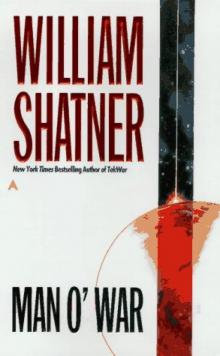 Man O' War
Man O' War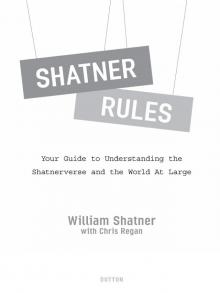 Shatner Rules
Shatner Rules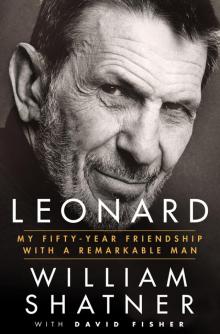 Leonard
Leonard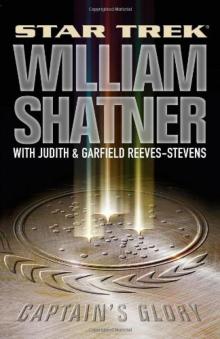 Captain's Glory
Captain's Glory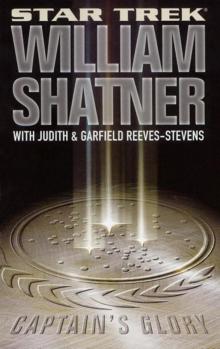 Captain's Glory зпвш-9
Captain's Glory зпвш-9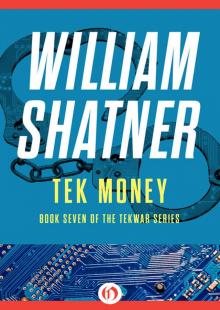 Tek Money
Tek Money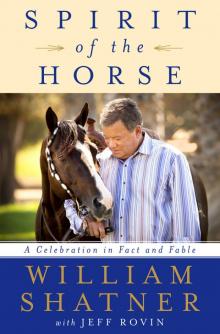 Spirit of the Horse
Spirit of the Horse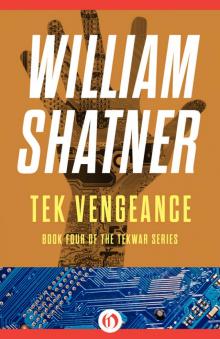 Tek Vengeance
Tek Vengeance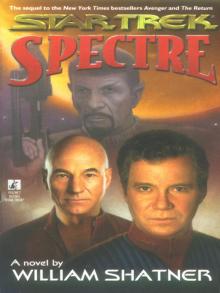 Spectre
Spectre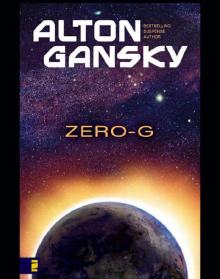 Zero-G
Zero-G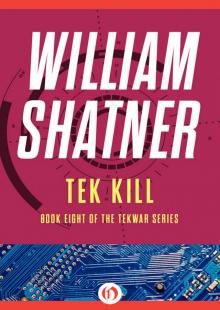 Tek Kill
Tek Kill Collision Course
Collision Course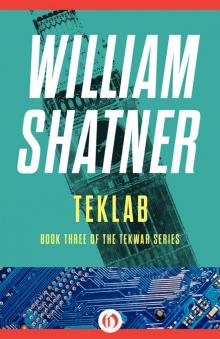 TekLab
TekLab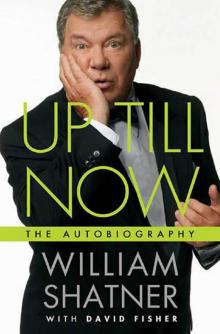 Up Till Now
Up Till Now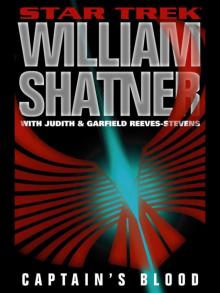 Captain's Blood
Captain's Blood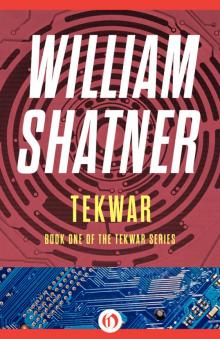 TekWar
TekWar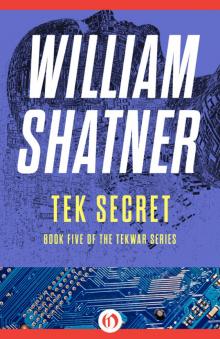 Tek Secret
Tek Secret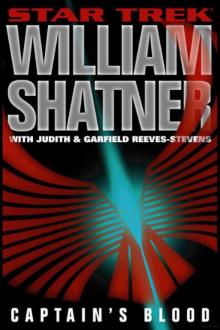 Captain's Blood зпвш-8
Captain's Blood зпвш-8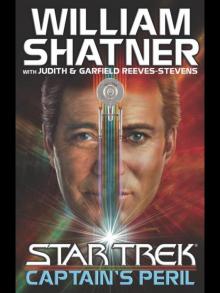 Captain's Peril
Captain's Peril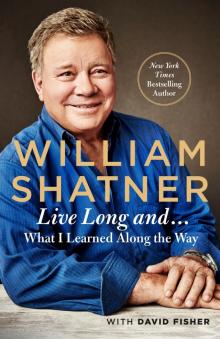 Live Long and . . .
Live Long and . . .